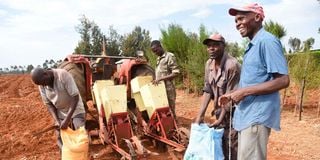Uasin Gishu got the bulk of subsidised fertiliser, audit reveals

Farmers in Kabenes, Uasin Gishu County, plant maize. The region received subsidised fertiliser valued at Sh3.6 billion.
Residents of Uasin Gishu County were the biggest beneficiaries of the subsidised fertiliser programme introduced by the government in September last year, a new report shows.
The county received 789,763 bags of fertiliser out of the 3.4 million supplied across the country as of June, the Auditor-General says.
The input to Uasin Gishu, valued Sh3.6 billion, was 23 percent of the fertiliser supplied through the scheme.
Nakuru County, which received 440,998 bags comes second, while Trans Nzoia is third, with farmers in there getting 315,370 bags of fertiliser.
The special audit on supplementary budget expenditure and withdrawal of public funds notes that the National Treasury approved Sh7.5 billion for the programme in the 2022/23 financial year.
“The Ministry of Agriculture and Livestock Development launched the fertiliser e-subsidy in September 2022. In the financial year 2022/2023, the National Treasury approved Sh7,493,923,200 for the programme,” Auditor-General, Nancy Gathungu, says in the report.
During the special audit to establish usage of the funds sought as an emergency soon after Dr William Ruto took office as president, auditors analysed the operation of the programme in 17 counties.
The 17 received 2,348,831 bags of fertiliser valued Sh10.8 billion, accounting for 68 per cent of the input distributed through the programme.
The subsidy was aimed at cushioning farmers from the high cost of fertiliser.
Other major beneficiaries of the programme were Nandi County (171,123 bags), Migori (112,338), Kericho (85,338), Narok (80,422), Kakamega (67,347), Bomet (66,618) and Meru (54,017 bags), closing.
The top five counties –Uasin Gishu, Nakuru, Trans-Nzoia, Nandi and Migori – received 53.4 percent of the fertiliser.
By the end of June 2023, some 3,228,491 farmers in 41 counties had been registered in the database of the Ministry of Agriculture and 3,628,530 electronic vouchers issued.
“Records at the ministry indicate that 3,426,884 bags of fertiliser had been distributed through 142 depots and selling centres throughout the Country,” Ms Gathungu says.
The audit, however, established that farmers faced numerous challenges, including inaccessibility of distribution centres.
This made farmers to travel long distances.
There was also the distribution of the wrong type of fertiliser and failure by the government to monitor the success of the programme.
“The audit team revealed that the fertiliser had been distributed to farmers. However, farmers did not effectively benefit...as the distribution was not in time for the planting season,” it says.




